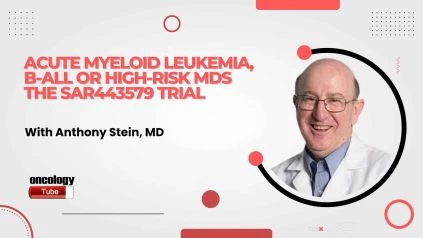Anthony Stein, MD, from the City of Hope, has conducted a first-in-human study to evaluate the safety and efficacy of a new treatment called CD123 NK Cell Engager SAR443579 in patients with relapsed or refractory acute myeloid leukemia (R/R AML), B-cell acute lymphoblastic leukemia, or high-risk myelodysplasia.
The study aimed to assess the drug’s ability to activate natural killer (NK) cells and target cancer cells expressing the CD123 antigen.
SAR443579 is designed to engage both NKp46 and CD16a receptors on NK cells, forming a cytolytic synapse with CD123-positive tumor cells.
This interaction leads to the activation of NK cells, resulting in the killing of tumor cells.
The phase 1/2 trial (NCT05086315) provided preliminary safety and efficacy data on SAR443579.
The trial included a total of 23 R/R AML patients across six different dose levels.
Patients received SAR443579 intravenously twice-weekly or once weekly for the first two weeks of the treatment cycle, followed by weekly administration for the rest of the induction cycles.
Those who achieved complete remission (CR) or incomplete hematologic recovery (CRi) transitioned to a maintenance period with less frequent dosing.
The results, as of January 27, 2023, showed that SAR443579 was well-tolerated up to a dose of 3000 µg/kg once weekly.
No dose-limiting toxicities were observed until the highest dose level. The most common treatment-related adverse events included infusion-related reactions and nausea.
Grade 3/4 adverse events were reported in 78.3% of patients, but there were no treatment-related adverse events leading to the discontinuation of SAR443579.
Regarding efficacy, the composite complete remission (CRc) rate was 13.0% among the evaluable patients.
In the dose levels with a maximum dose of 1000 µg/kg once weekly, 37.5% of patients achieved a CR (2 CR and 1 CRi).
The median time to the first CR/CRi was 16.1 weeks, and the median duration of CR/CRi was not estimable due to limited follow-up time.
Based on these findings, SAR443579 demonstrated promising anti-leukemic activity in patients with R/R AML. The trial is ongoing, with more patients being enrolled to gather further data on the drug’s safety and efficacy.
In conclusion, this first-in-human study of CD123 NK Cell Engager SAR443579 showed that the treatment was well-tolerated and provided clinical benefit to patients with relapsed or refractory acute myeloid leukemia.
Further investigation is needed to establish its full potential as a therapeutic option. The clinical trial is registered under NCT05086315.

